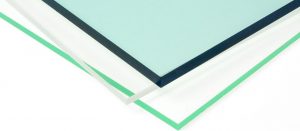 There are many types’ of plastics available and determining which is right for demanding applications can be very challenging. Whether it is precision plastic manifolds for the medical and life science sectors or components for fine writing instruments, we can help you understand the basics of plastic selection.
There are many types’ of plastics available and determining which is right for demanding applications can be very challenging. Whether it is precision plastic manifolds for the medical and life science sectors or components for fine writing instruments, we can help you understand the basics of plastic selection.
Clear Plastics
Typically, clear, these plastics once machined often become translucent or opaque. Polishing is then necessary to return the item to its original clear state. There are several different polishing methods available depending on the clarity required; these methods include machine polishing, vapour polishing, flame polish and manual buffing. Clear engineering plastics include Acrylic (PMMA), Polycarbonate (PC) and Polyester (PET).
Loading Strength
Tensile and compression strength are important factors when choosing plastics especially when the application requires a certain level of structural strength. High strength plastics include PolyEtherImide (PEI – Ultem), PolyEther Ether Ketone (PEEK) and PolyOxyMethylene (POM – Delrin).
Thermal Stability
Plastics that are resistant to high levels of heat are constantly being developed and are becoming more common in traditional and in high-end industrial applications to improve performance and durability.
Plastics are often considered not to be heat resistant; however, there are whole families of high perfor-mance plastics that can be used at permanent service temperatures of more than 150°C up to over 300°C. Suitable plastics include PolyEtherImide (PEI – Ultem) and PolyEther Ether Ketone (PEEK).
Impact Resistance
This is the measurement of the plastics ability to withstand a sudden knock or shock. Good choices of high impact resistance plastics include PolyCarbonate (PC) and PolyEther Ether Ketone (PEEK).
Chemical Resistance
Choosing a plastic material that is appropriate for use in a chemical environment is rarely straightforward. Chemicals can often affect the strength, flexibility, colour, surface appearance, dimensions and cracking of the plastic.
The chemical resistance of plastics really depends on the type in question. Some plastics will show an almost universal resistance to chemicals, whilst others are extremely sensitive. Those that are highly resistant to chemicals include PolyEther Ether Ketone (PEEK), Polyester (PET) and PolyMethyl MethAcrylate (PMMA). A good place to start when assessing suitable plastics for certain chemicals are on-line chemical compatibility charts, although these do not cover all types and concentrations so we always promote sample and accelerated life testing to give greater confidence.
UV Resistance
Resistance to UV is an important factor especially when the plastic is used outdoors. Poor resistance to UV will lead to damaged, aged and brittle plastic. It is a good idea to avoid black coloured plastics that have little UV resistance. Good choices include PolyEtherImide (PEI – Ultem) and PolyCarbonate (PC).
Biocompatibility
Bio-compatible plastics must have the ability to act and perform without impairing basic immunological functions of the body. The use of biocompatible plastics in the medical and life science sectors are required to operate without causing injury, negative physiological, allergic or toxic reactions. It does depend on the nature of human or animal application, however examples of often suitable materials for bio-compatible applications include Polyethylene (PE) ,PolyEther Ether Ketone (PEEK), PolyCarbonate (PC) , PolyEtherImide (PEI – Ultem), PolyPropylene (PP).
FDA Approved Plastic Materials
Plastics that come into contact with food or drink are required to be made of a certain type of plastic. The FDA (Food & Drug Administration) in the USA provide certain specifications regarding the composition and the properties of plastics. Materials meeting these standards can then be stated as FDA compliant. Suitable plastics include PolyMethyl MethAcrylte (PMMA), PolyOxyMethylene (POM – Delrin), Polyester (PET), PolyCarbonate (PC) and PolyEther Ether Ketone (PEEK).
————————————————————————–
Carville began to produce machined acrylic (PMMA – Plexiglas) components in the 1930’s. With 90 years of experience, we produce precision components in a wide range of engineering grade plastics including:
PolyMethyl MethAcrylate (PMMA)
PolyCarbonate (PC)
Polyester (PET)
Polyethylene (PE)
PolyOxyMethylene (POM – Delrin)
PolyPropylene (PP)
PolySUlphone (PSU)
PolyEtherImide (PEI – Ultem)
PolyEther Ether Ketone (PEEK)



